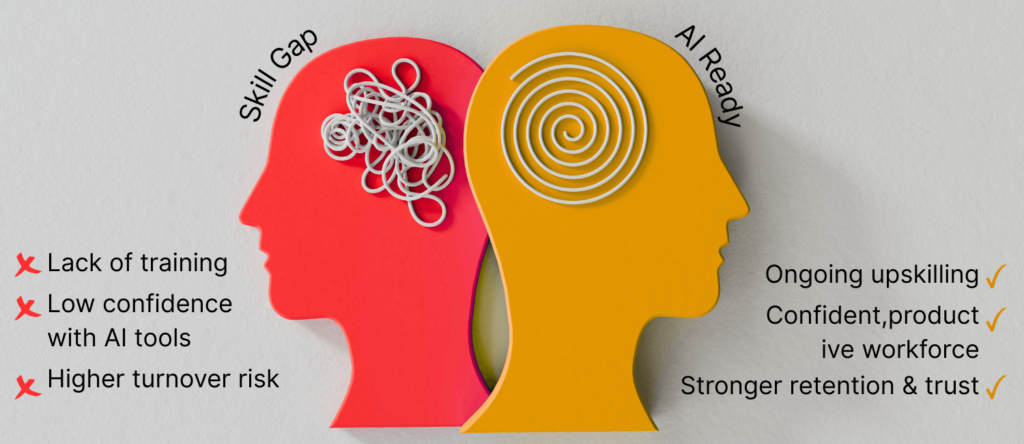The AI skills gap in SMEs isn’t just about technology. It’s about people. Many employees feel unprepared to use AI tools, and this lack of confidence is pushing them to look elsewhere for work.
For small businesses, the risk is serious: higher turnover, lost productivity, and greater recruitment costs. The good news is SMEs can act now to prepare.
What the Data Tells Us
Recent studies show how big the gap really is:
- 74% of young UK employees use AI at work, but only 52% have received formal training, and just 14% say it was effective. (Corndel Workplace Training Report 2025)
- 80% of UK workers say they don’t fully understand how to use AI effectively.
- Employee turnover costs SMEs around £12,000 per leaver, rising to £25,000 for skilled roles.
These figures show that the AI skills gap in SMEs is more than a learning challenge; it’s a retention risk.
Why the AI Skills Gap Matters for SMEs

- Turnover hits harder – Losing one person in a small team can disrupt client relationships, delay projects, and damage morale.
- Employer reputation – Talented workers want to join organisations that invest in future skills. SMEs that fail to do this may struggle to attract new staff.
- Wasted productivity – According to research, employees waste an average of 13 hours per week on tasks AI could automate. Without training, these opportunities are missed.
- Falling behind competitors – SMEs that fail to build AI literacy risk being left behind as customers and clients expect faster, smarter services.
How SMEs Can Close the AI Skills Gap
Here are four practical ways to start bridging the AI skills gap in SMEs today:
Conduct a Skills Audit
- Survey staff to find out what AI tools they use.
- Identify gaps in knowledge.
- Prioritise training where it will have the biggest impact.
Start Small with Training
- Offer short workshops or lunch-and-learns.
- Use free or low-cost online learning platforms.
- Create internal “AI champions” who can mentor others.
Build AI into Onboarding
- Introduce AI literacy training for every new hire.
- Show how AI supports day-to-day work.
- Reinforce a culture of curiosity and learning.
Communicate and Support
- Be transparent about changes.
- Reward staff who upskill.
- Provide reassurance for those anxious about new technology.
The AI skills gap in SMEs is as much a people challenge as it is a technology challenge. Employees who feel unsupported are more likely to leave, creating costs that small businesses can’t ignore.
By investing in training and support now, SMEs can reduce retention risk, boost productivity, and build a reputation as forward-thinking employers.




